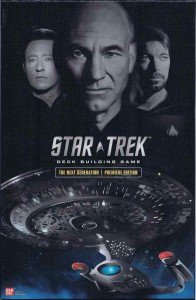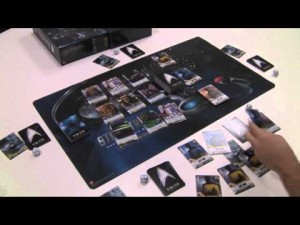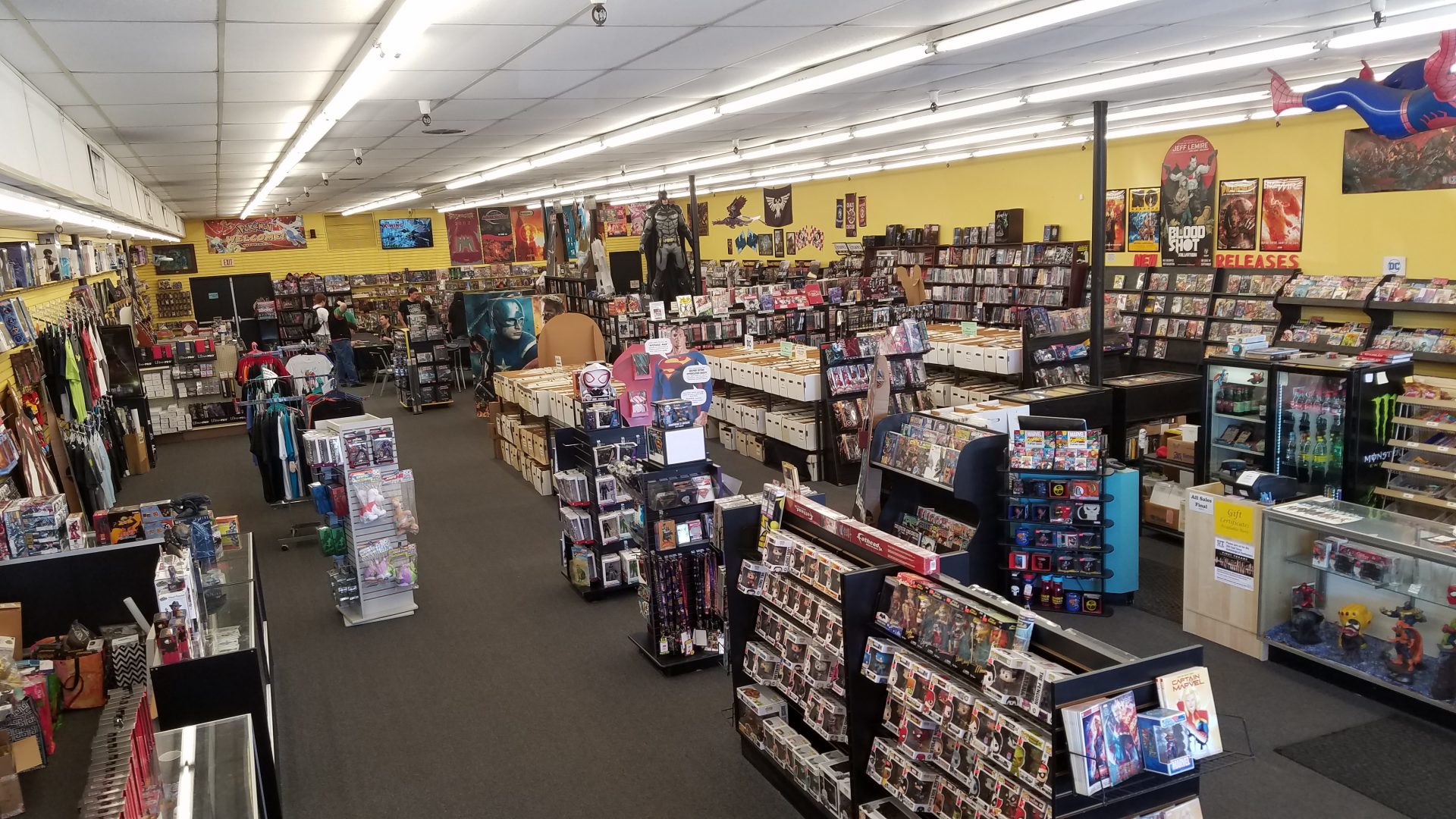 In my review of Star Trek: Fleet Captains, I claimed that it was the best Star Trek game I had ever played. That is still true. No game captures the feel of the Trek universe better, or more comprehensively, than Fleet Captains. That game is a masterpiece of marrying a license to innovative gameplay mechanics, and is a loving tribute to a franchise we all love (all of us. That includes you.) The Star Trek Deck-Building Game, however, is the best game using the Star Trek license that I’ve ever played. That’s a subtle, but important, distinction. In terms of which is the better game, there’s no question in my mind – the Deck-Building Game is a tour-De-force of card design and gameplay mechanic ingenuity, and is simply one of the best-designed games I’ve ever had the pleasure of playing – Trek license or no. However, that being said, it doesn’t capture the Trek ethos nearly as well as Fleet Captains does. That’s not to say that it doesn’t feel like Star Trek – it just feels like a game that is Trek more because there are pictures of Patrick Stewart and the Enterprise on the cards, and not necessarily because the mechanics are in and of themselves Trek-like.
In my review of Star Trek: Fleet Captains, I claimed that it was the best Star Trek game I had ever played. That is still true. No game captures the feel of the Trek universe better, or more comprehensively, than Fleet Captains. That game is a masterpiece of marrying a license to innovative gameplay mechanics, and is a loving tribute to a franchise we all love (all of us. That includes you.) The Star Trek Deck-Building Game, however, is the best game using the Star Trek license that I’ve ever played. That’s a subtle, but important, distinction. In terms of which is the better game, there’s no question in my mind – the Deck-Building Game is a tour-De-force of card design and gameplay mechanic ingenuity, and is simply one of the best-designed games I’ve ever had the pleasure of playing – Trek license or no. However, that being said, it doesn’t capture the Trek ethos nearly as well as Fleet Captains does. That’s not to say that it doesn’t feel like Star Trek – it just feels like a game that is Trek more because there are pictures of Patrick Stewart and the Enterprise on the cards, and not necessarily because the mechanics are in and of themselves Trek-like.
Hopefully that last paragraph made some modicum of sense. If it didn’t, read on, and I’ll try and give you a better feel for what you’re getting into here. The STDGBG is one of the latest in a growing trend among boxed tabletop hobby games – the Deck-Building Game. The genre began with Dominion, and has become increasingly popular the more time passes. Essentially, Deck-Building Game’s are all about starting with a weak deck of cards (usually standardized among the players) and “buying” new cards into your deck in an effort to make it better, while pruning out cards that don’t help you as much.
In the STDBG, players each begin with a 10-card deck that’s the exact same for each player, plus a starting ship (a puny Constellation-class cruiser with no bonuses). On each turn, you’ll start with five cards in your hand, and you can play these to your bridge for various effects. Cards can basically be broken down into two different categories – those that help make your deck better, and those that help you attain the all-important victory points. There are some cards that fit into both roles, but the best in each category only do one thing. Among the cards that help make your deck better are basic characters, which give you “XP” that you can spend to purchase a constantly-rotating group of character, maneuver, and setup cards from the center of the table (called the starbase), upgrade cards such as Starfleet Academy and Peak Performance, which allow you to trade a card in your deck for a somewhat better one from the Starbase, and also cards which simply get rid of cards in your deck – which makes the probability of drawing the really good cards on your turn that much higher. As far as cards that help you to get victory points, there are just two basic types – Characters, which give bonuses to your ship’s attack, speed, diplomacy, or shields, and sometimes provide an effect, and Maneuvers, which give bonuses to your ship’s attack, speed, diplomacy, or shields, and sometimes provide an effect – so really just one card type, although the distinction between the two is important, as some card effects target only maneuvers, and some target only characters. Additionally, each character only appears once, while Maneuvers (and Setups) can appear up to five or six times in the Starbase deck.
 Once you’ve done all you can or want to as far as making your deck better on your turn, if you’re confident with the bonuses your ship has received (for instance, if Worf and Tasha Yar were in your hand to greatly increase your Speed and Attack values), you can opt to “explore” into the Space Deck, at which point you’ll turn over the top card of that deck, and have to deal with either a mission, an event, or an opposing starship. Aside from a few events, all the cards in the space deck are worth points, and the first player to reach 400 wins the game.
Once you’ve done all you can or want to as far as making your deck better on your turn, if you’re confident with the bonuses your ship has received (for instance, if Worf and Tasha Yar were in your hand to greatly increase your Speed and Attack values), you can opt to “explore” into the Space Deck, at which point you’ll turn over the top card of that deck, and have to deal with either a mission, an event, or an opposing starship. Aside from a few events, all the cards in the space deck are worth points, and the first player to reach 400 wins the game.
Explaining all this without visual aids makes it all sound much more complex than it really is. In truth, this, like all the best games, is extremely simple to learn, and very difficult to master. The number of cards in the game’s basic set alone is enough to keep the combinations fresh and interesting for a long, long time, and there’s already one expansion set out, with more on the horizon. Add to that the fact that each set comes with multiple scenarios, which essentially replace the space deck with something entirely different, at the same time subtly altering the core rules, and you’ve got even more ways to play. The basic set comes with the Exploration scenario (which is the basic one described above), the Klingon Civil War scenario, which is team-based, and the Borg Invasion scenario, which is co-operative, with all the players working together to defeat the Borg deck. The expansion comes with cards to increase the previous 3 scenarios to 9-player games, as well as an all-new 9-player scenario, Romulan Reunification (which is also team-based).
 I simply cannot give this game a higher recommendation. If you’ve ever had a passing interest in Star Trek, and ever thought to yourself “gee, Monopoly’s ok, but what I’d really like is something a little more substantial”, than please, please, PLEASE, do yourself a favor and buy this game. If you’re curious about it, our Friday night board game group here at Ground Zero almost always has it on hand, and is more than willing to let you sit in on a game and learn the ropes to see if it’s right for your group.
I simply cannot give this game a higher recommendation. If you’ve ever had a passing interest in Star Trek, and ever thought to yourself “gee, Monopoly’s ok, but what I’d really like is something a little more substantial”, than please, please, PLEASE, do yourself a favor and buy this game. If you’re curious about it, our Friday night board game group here at Ground Zero almost always has it on hand, and is more than willing to let you sit in on a game and learn the ropes to see if it’s right for your group.
As one final note, I know these game reviews haven’t been the most regular occurrences around here anyways (I’ve done what, 4, counting this one?), but this is likely the last one, at least for a while. I’ve started a twice-weekly column over at examiner.com (you can find and subscribe to it here: http://www.examiner.com/dc-comics-in-dallas/michael-seigler), and those updates are going to appear here 3-4 days after they’ve gone up on examiner. Needless to say, as little as I could get off my butt and write these in the first place, with my hands full like that these likely won’t show up again. Its been fun, though, and I really hope you check out my examiner articles, either on this site or on examiner.com (preferably on examiner – I don’t get paid if you read them here!)


